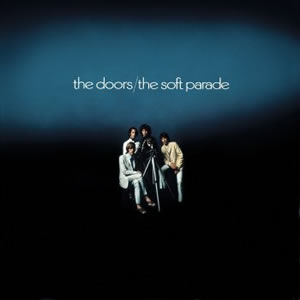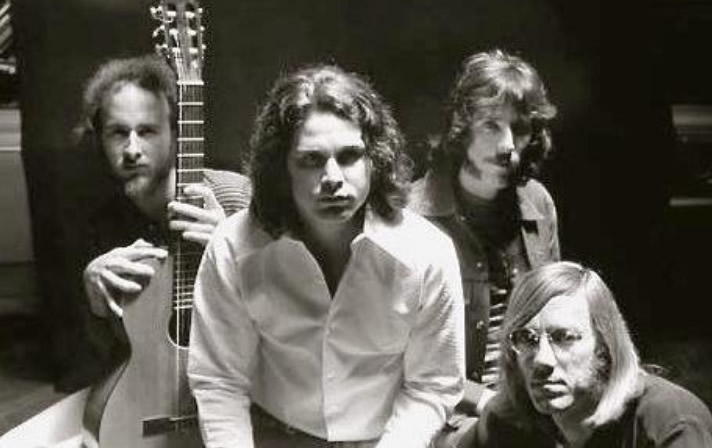The Soft Parade by The Doors
 1969 was a tumultuous year for the The Doors. The main incident which caused their collective headache happened in Miami in March when vocalist Jim Morrison was arrested for allegedly exposing himself during a concert. Consequently, many major promoters began cancelling shows. The group, which had been a top international pop/rock coming into the year, selling out venues such as New York’s Madison Square Garden, suddenly found themselves scrambling to get gigs. In the midst of all this came the release of their fourth album The Soft Parade, which contained a radically different sound for the Doors and faced harsh criticism because of it. But when you remove all the fog surrounding it, The Soft Parade is a diverse, entertaining, and totally unique album of a great American band at a musical crossroads.
1969 was a tumultuous year for the The Doors. The main incident which caused their collective headache happened in Miami in March when vocalist Jim Morrison was arrested for allegedly exposing himself during a concert. Consequently, many major promoters began cancelling shows. The group, which had been a top international pop/rock coming into the year, selling out venues such as New York’s Madison Square Garden, suddenly found themselves scrambling to get gigs. In the midst of all this came the release of their fourth album The Soft Parade, which contained a radically different sound for the Doors and faced harsh criticism because of it. But when you remove all the fog surrounding it, The Soft Parade is a diverse, entertaining, and totally unique album of a great American band at a musical crossroads.
Recording for the album began in November 1968. From these initial sessions came a very successful Top 5 single (“Touch Me”/”Wild Child” in December 1968). In fact, more than half of The Soft Parade‘s material was released on singles prior to the album’s release in July of 1969, something totally unique for any Doors album. As Morrison struggled with substance abuse and erratic behavior, guitarist Robbie Kreiger stepped up and wrote half the material for the album including all four singles. Producer Paul Rothchild decided to enhance the group’s sound with the inclusion of brass and string arrangements, which was off-putting to many rock purists but (in this reviewer’s opinion) made for very interesting fusion with Morrison’s poetry and subject matter.
In fact, while the year was harmful for the band’s career momentum, it may well have been the height of The Door’s creativity. Further evidence of this can be found in the recent release of outtakes of unfinished songs. “Whiskey, Mystics and Men” is similar to the track “My Wild Love” from the previous album Waiting for the Sun, but this time Morrison’s poetic chant is complemented by a full band arrangement led by Ray Manzarek‘s harpsichord. “Push Push” is a jazzy Latin instrumental jam featuring Manzarek on piano and drummer John Densmore. Originally released as a ‘B Side’ of a single, “Who Scared You” is a good pop tune with a bluesy swing, some funky horn arrangements, and a cool solo by Krieger.
 The Soft Parade by The Doors |
|
|---|---|
| Released: July 21, 1969 (Elektra) Produced by: Paul Rothchild Recorded: Elektra Sound Recorders, Los Angeles, July 1968–May 1969 |
|
| Side One | Side Two |
| Tell All the People Touch Me Shaman’s Blues Do It Easy Ride |
Wild Child Runnin’ Blue Wishful, Sinful The Soft Parade |
| Band Musicians | |
| Jim Morrison – Lead Vocals, Percussion Robby Krieger – Guitars, Vocals Ray Manzarek – Piano, Keyboards John Densmore – Drums, Percussion |
|
Krieger’s “Tell All the People” starts The Soft Parade with an intro of blistering horns which give way to a pleasant pop melody. The song is most interesting due to the sheer un-Doors-ness of the track in total and the climax at the end of the second verse with slight melodic variation and quick Kreiger solo. Morrison left no doubt about his disdain for this song, which was released as a single but failed to reach the Top 40. Like the opener, “Touch Me” contains rich orchestral arrangements by conductor Paul Harris. Another Krieger composition, it has a distinctly Las Vegas feel to it and was allegedly derived from a blackjack phrase (“c’mon hit me babe, I am not afraid”). The song’s outro includes a sax solo by Curtis Amy and reached #3 on the US charts while topping the charts in several other countries.
The remainder of the first side features songs with only the four Doors members. Morrison’s “Shaman’s Blues” contains a fine vocal performance and entertaining lyrical motifs. Kreiger performs a whining guitar riff throughout and blues later solo while Densmore’s odd-measured drumming keeps the song interesting yet glued together, especially during his inventive fills. Overall, the song pulls the listener into a trance-like groove. “Do It” is much less potent lyrically but draws you in with its hard rock groove. The bouncy and light “Easy Ride” has an almost polka beat and feel, as a celebration of pure joy throughout with the song’s coda deviating slightly into a more rock-oriented journey during a long fade out.
“Wild Child” is the best overall song on the album, despite its very succinct length of two and a half minutes. It starts with a deep rock riff and hook chant but soon Kreiger’s guitar morphs into a bluesy slide riff as the song breaks into several inventive parts in an asymmetrical journey guided by Morrison’s fantastic and philosophical lyrics. The exact meaning of these lyrics (and the song’s protagonist) has been debated for decades, ranging from Arthur Rimbau to Jesus Christ to Morrison himself. Kreiger’s “Runnin’ Blue” is a complete left turn and one of the strangest Doors songs ever (and that is saying something!). A clever fusion of bluegrass and soul with a full brass arrangement and co-lead vocals by Kreiger during the refrains. The song is also a light tribute to the late Otis Redding and was another non-charting single from The Soft Parade.

The fourth single from the album, “Wishful Sinful” was a minor hit on the charts. Light and beautiful, the orchestral arrangements on this song are finer than anywhere else especially due to the English horn lead by Champ Webb. But the song also contains perfectly melancholy vocals by Morrison and a stirring rhythm led by session bassist Harvey Brooks who masterfully works with Densmore to keep the rock core of this airy song.
As the album itself is such a diverse musical adventure, it is only fitting that the concluding title song reflect this path to the extreme with its own adventurous mini-suite. Morrison’s “The Soft Parade” follows the pattern of closing an album with an extended tour-de-force, as on the group’s first two albums. However, this track is much different, an almost child-like wonderland movement that goes through each distinct phrase until reaching the rock and soul-influenced final parts (“the best part of the trip”) Much like a true “parade” of an English fugue, the song morphs from Morrison’s a capella sermon-like intro to a Baroque ballad to a show tune-like section to the long rock outro, the music masterfully follows the flowing, stream of consciousness lyric. Morrison’s vocals are doubled throughout, and often talk to each other on separate channels, giving the fuller meaning much to contemplate, especially after the hook section halfway through the song.
Despite the sour critical response, The Soft Parade reached #6 on the album charts and stands shoulder-to-shoulder with any other of the group’s studio albums. A few days after the album’s release, The Doors recorded a few concerts which would become the basis for their 1970 live album Absolutely Live as well future Doors collection. Here, the quality of the band’s music is further displayed as the Doors concentrated on making great music despite the external distractions of 1969.
~
Part of Classic Rock Review’s celebration of 1969 albums.





March 17, 2015 @ 7:43 am
Good review of a very good album – so many lazy reviews of this LP out there which is actually criminally under-rated. I find this LP had fewer fillers (if there is such a thing) . Disagree about Wild Child being the standout track though, but we all have our favourites. Just treated myself to a lovely 180gram copy of this, and it has so much energy, possibly born out of the frustration The Doors found themselves in at this period. Six LP’s all in quick succession – all incredible. Hints of ‘Love’ on this LP. Morrison for the best voice in rock ever? That beautiful baritone… Kreiger’s vocals on Runnin’ Blue remind me of something from The Simpsons – and always make me smile…The title track itself is so ‘happy’ and light in places…more like a compilation of unused song parts, but it’s clever and works well..a bit reminiscent of Leonard Cohen.The Doors left us with six wonderful LP’s that should never be overlooked or under-estimated.
March 17, 2015 @ 9:08 am
Thanks, Dave. I’ve found every Doors album has its own distinct flavor and they are all excellent in their own way.
We have one more to review – Morrison Hotel – which we’ll do in either May or June during our look at 1970 albums.
September 8, 2020 @ 12:13 pm
Love all of the doors and Jim’s work. Stand alone for me. So unique and a breath of fresh air. It sucked that he had a hard time in Paris and OD. He had potentially so much more to offer. But his leaving here made him more popular. Diehard fan forever
February 3, 2022 @ 5:25 pm
Just wanted to say thank you for your excellent and spot-on comments. I do think that wild child is an excellent song, but like you say, everyone has their favorites. I am just so grateful this album exists. It isn’t perfect, but it is an effort by the Doors to try something bold and different, one might say experimental even. And I for one salute that and love it. A highly recommended album.
November 19, 2017 @ 2:21 pm
I love all the Doors albums and music. I feel the Doors have kept their music guarded with love and alive for every generation to get to know them and turn on to their great music. As time has gone on in hind sight many people have come to know how special the Doors are. I think Jim was telling us about himself or what he thought in almost every song he wrote. Some of the members have sadly passed but their music never dies.
July 27, 2018 @ 4:27 pm
Nice review. I think Soft Parade is one of the most underrated albums of the sixties. Title tack is a bit self-indulgent, but what’s rock and roll without a little mad grandiosity now and then?
January 20, 2019 @ 3:57 pm
Am I alone in thinking the Soft parade is 1 of the best Doors Songs , (definitely in my top 5 songs anyway) ? I love the images the poetic lyrics create and the journey the song takes you on …